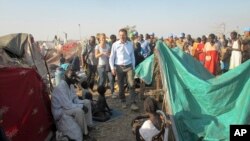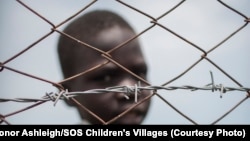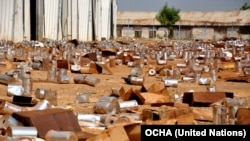JUBA —
Aid agencies in South Sudan are racing against the clock to get food and other assistance to millions of people suffering from the "devastating consequences" of the conflict that has raked the young country since December, a top United Nations official said Tuesday.
The United Nations appealed for $1.27 billion to help its agencies and NGOs to strategically position aid supplies for delivery before the rainy season begins; to protect the rights of vulnerable people, including the tens of thousands who sought refuge at U.N. compounds during the fighting; and to transport aid workers and supplies to the camps housing the displaced.
"The priority is to save lives now and ensure that we have food, medicine and other lifesaving supplies prepositioned in the field, in easy reach of aid agencies before the rains hit and the roads become impassable,” the U.N.'s Humanitarian Coordinator in South Sudan, Toby Lanzer, told a news conference in Juba.
“We are talking about providing relief for displaced people and host communities, for refugees and other communities whose livelihoods have been destroyed. We are talking about providing emergency relief, upholding people’s rights and strengthening people’s livelihoods,” Lanzer said.
Nearly 900,000 people have fled their homes in South Sudan, thousands more have been hurt or wounded during the fighting, livelihoods have been lost and people’s ability to move livestock to pasture, to fish or to hunt, has been severely compromised by the fighting, Lanzer saod.
He urged relief operations to ramp up quickly so that aid is in place before the rainy season starts, which is usually in March. The rainy season makes access to many parts of South Sudan even more difficult, if not impossible.
Jonglei, Unity and Upper Nile states, from which hundreds of thousands have fled fierce fighting between pro- and anti-government forces, are in the most dire need of aid.
The U.N. Office for the Coordination of Humanitarian Affairs (OCHA) said seven in 10 people in Jonglei state are in under "acute, emergency food insecurity." In Unity state, nearly two-thirds of the population is severely food insecure and in Upper Nile, nearly half -- 46 percent -- the population is.
During nearly six weeks of violence, some 4,700 tonnes of aid items -- mostly food -- were looted from U.N. storage facilities around South Sudan, creating another hurdle for aid providers.
Most of the looting took place in parts of the country that were hardest hit by the violence, including Bor, the capital of Jonglei state, and Malakal, capital of Upper Nile.
The head of the SOS Children's Villages NGO, which runs a long-term care project for orphaned and abandoned children in Malakal, told VOA Tuesday that the massive looting of U.N. food stores has helped to drive up food prices, making it even more difficult to procure and deliver much-needed food aid to people in need.
"Food right now is at an all-time premium," Lynn Croneberger, CEO of SOS Children's Villages - USA, which has been in Sudan and South Sudan since the late 1970s, said.
"It's three-four times the normal cost so it's blown our budgets out of proportion. We need money to buy food, baby food, water," she said.
Croneberger said the violence in Malakal has "decreased a little bit" since the signing 12 days ago of a cessation of hostilities agreement between the warring sides, allowing staff at the children's village "to venture out to find food, to find water."
"But we're still keeping the children in the village to keep them safe," she said.
Lanzer said UN agencies are working closely with community leaders and UN peacekeepers to ensure food stocks that are pre-positioned in areas where security has not yet been fully re-established will be protected from looters.
Nabeel Biajo and Karin Zeitvogel in Washington, D.C. contributed to this story
The United Nations appealed for $1.27 billion to help its agencies and NGOs to strategically position aid supplies for delivery before the rainy season begins; to protect the rights of vulnerable people, including the tens of thousands who sought refuge at U.N. compounds during the fighting; and to transport aid workers and supplies to the camps housing the displaced.
"The priority is to save lives now and ensure that we have food, medicine and other lifesaving supplies prepositioned in the field, in easy reach of aid agencies before the rains hit and the roads become impassable,” the U.N.'s Humanitarian Coordinator in South Sudan, Toby Lanzer, told a news conference in Juba.
“We are talking about providing relief for displaced people and host communities, for refugees and other communities whose livelihoods have been destroyed. We are talking about providing emergency relief, upholding people’s rights and strengthening people’s livelihoods,” Lanzer said.
Nearly 900,000 people have fled their homes in South Sudan, thousands more have been hurt or wounded during the fighting, livelihoods have been lost and people’s ability to move livestock to pasture, to fish or to hunt, has been severely compromised by the fighting, Lanzer saod.
He urged relief operations to ramp up quickly so that aid is in place before the rainy season starts, which is usually in March. The rainy season makes access to many parts of South Sudan even more difficult, if not impossible.
Seven in 10 in Jonglei face hunger
Jonglei, Unity and Upper Nile states, from which hundreds of thousands have fled fierce fighting between pro- and anti-government forces, are in the most dire need of aid.
The U.N. Office for the Coordination of Humanitarian Affairs (OCHA) said seven in 10 people in Jonglei state are in under "acute, emergency food insecurity." In Unity state, nearly two-thirds of the population is severely food insecure and in Upper Nile, nearly half -- 46 percent -- the population is.
During nearly six weeks of violence, some 4,700 tonnes of aid items -- mostly food -- were looted from U.N. storage facilities around South Sudan, creating another hurdle for aid providers.
Most of the looting took place in parts of the country that were hardest hit by the violence, including Bor, the capital of Jonglei state, and Malakal, capital of Upper Nile.
Looting drives up food prices
The head of the SOS Children's Villages NGO, which runs a long-term care project for orphaned and abandoned children in Malakal, told VOA Tuesday that the massive looting of U.N. food stores has helped to drive up food prices, making it even more difficult to procure and deliver much-needed food aid to people in need.
"Food right now is at an all-time premium," Lynn Croneberger, CEO of SOS Children's Villages - USA, which has been in Sudan and South Sudan since the late 1970s, said.
"It's three-four times the normal cost so it's blown our budgets out of proportion. We need money to buy food, baby food, water," she said.
Croneberger said the violence in Malakal has "decreased a little bit" since the signing 12 days ago of a cessation of hostilities agreement between the warring sides, allowing staff at the children's village "to venture out to find food, to find water."
"But we're still keeping the children in the village to keep them safe," she said.
Lanzer said UN agencies are working closely with community leaders and UN peacekeepers to ensure food stocks that are pre-positioned in areas where security has not yet been fully re-established will be protected from looters.
Nabeel Biajo and Karin Zeitvogel in Washington, D.C. contributed to this story









